“It hardly matters now, I’m sure she—”
“Shall I tell her this life is a lie?” I interrupt.
“Say what you like,” Thessinger says. “She is owned.” He leaves without another word.
Cledilce Macedo is waiting in a booth by the window at the Kopenhagen. She is resplendent in silver and black, her hair plaited and studded with jewels. I feel this meeting is part of the dream and that, in it, a solution will be revealed. I sense no threat.
“ Cumo vai ?” she says.
“I’m well” I say. “The police? They hurt you?”
She smiles and says, “They didn’t kill me.”
“I wanted to go back for you.”
She waves her hand, dismissing the idea. “You look good.”
“You shouldn’t have come. They lied, it’s not like our dream.”
“I had no choice,” Cledilce says. “He took you away from me.”
“I had to go. I killed Griffiths.”
“Juan was a fool. But why the Hernandez woman?”
Nausea hits me in the stomach. “What do you mean?”
Cledilce leans forward, touches my arm. “They were both killed by the same gun. It was in the reports; that’s why they couldn’t prove anything against me.”
The truth infects and sickens me. I stumble to the bathroom, Cledilce close behind. She holds me while I vomit, uttering words of comfort, words I haven’t heard since I left the other life. When there is nothing left to throw up I crouch on the floor, sobbing, searching for the words to beg forgiveness. But the words are dead on my tongue. Thoughts twist and reel in my skull and all I can do is sit and wait for the world to get back on an even keel.
In a room at the Kempinski Hotel, I watch the last of the daylight struggling through the blinds, falling on Cledilce’s mahogany flesh. The surgeons have crafted a fine vagina for her and her fingers explore me to the full; even so I derive no pleasure from her touch. The truth is, the sex we shared was more like that between whore and client than between two lovers, except in this instance, neither of us feels the need to fake anything. She’s silent and still but not sleeping. Neither of us has spoken for more than twenty minutes and the claustrophobic silence crushes any understanding we might have had. The gulf of the past yawns between us as I knew it would. I realize that what we’d once shared is now ashes.
I try to dream what is in her head. Once, we shared an intuition which was almost telepathic. I probe now but fail to penetrate the veil. Perhaps Cledilce has something to hide, doesn’t want me inside her head. Anxiety gnaws my brain. Rudy has lied again, as he always does; she came to take my place. The disease wakens inside me as, one day, it will awaken in her.
I get up and pull on my clothes, aware of Cledilce’s silent eyes following my movements. We stare at each other for a few seconds, knowing that we have nothing left to say, and sharing a fragile confusion as we acknowledge the death of the past. The moment slips by and I leave the room.
Heinrich returns with the purchase, unwraps it, and places it in my hand. The gun is dark, heavy, and silenced, filling me with a sense of power. I sit by the dressing table, searching my face in the mirror for the first signs, pondering the mess a bullet would make. I try to accept that it is Cledilce’s turn to live the dream and that my part in it is drawing to a close. But it’s not that easy, not when I picture the uncorrupted faith she still has in the charade, a faith that will allow her to usurp my role as the Queen of Berlin.
Light streams in the window, casting mottled patterns on the bed. Rudy will be here soon, to scour my flesh for warning signs, perhaps to gloat. Shame and fear crowd my skull, but I draw strength from hatred. The least I can do for Cledilce is spare her his attentions, the almost-obsessive concern he has shown me. In truth, ours has been a parasitic relationship: by allowing him to see himself as my protector, I give him strength and a sense of purpose; he, in turn, has organized my life in this city and, I realize now, protected me from certain unpalatable truths. It is time to rid myself of such false protection.
I put the gun inside my kimono and suck on the crystal pipe, just a little, enough to keep the dream alive. In the lounge, I drowse on the sofa, memories flitting back and forth through my mind; unedited and out of sequence, they provide a telling representation of my life. I wish I could unravel all the threads, but there is so little time.
Heinrich rouses me and announces Ms. Cledilce Macedo. A pang of guilt spears my heart as she enters the room. This is someone who I have both loved and betrayed; what has brought her to me at this moment? I feel delirious and immobilized. I think, has she come to witness my atonement, or simply to record my decay?
She kneels on the carpet at my feet and tells me that whatever I believe, she’s never blamed me for what happened. She knows Rudy manipulated me. I listen, and realize this is true. I see the clear beauty shining out of her dark eyes, remember nights of cool ecstasy, and wonder how she intends to spring the trap. She says she still loves and needs me, and her eyes hold me tight, screaming that this too, is the truth, and all the pain and bitterness of old betrayals well up inside as Cledilce tells me it is still possible for us to be together. And it is at this precise moment that I finally realize how I can atone for having sinned against her. I pull the gun from my kimono and, allowing her illusions of sanctuary to remain intact, I quietly shoot Ms. Macedo dead.
A short time later, Rudy arrives and finds me sitting on the sofa, the gun in my hand, the body at my feet.
Spengler let me live, after a fashion. At first I was puzzled, but then I saw that I owe my preservation to that which made me unique. With what they know now of the virus, they no longer deem it worthwhile to bestow refinements on Birds.
I’m a different creature now, virus-sculpted, ever-changing. Kleinfeld’s drugs have halted the hair loss and he treats me with synthetic Factor 8 to regulate the bleeding. Of course I no longer perform.
My new apartment looks out on the Siegessäule. I dream of climbing it soon to gaze down on the city from its magnificent perch; one day, when my strength returns. Then I shall swoop down on the Birds who stole my crown, to mock their preening beauty, perhaps to sing a lament for Cledilce.
Many months have passed since I last saw Rudy. I no longer wonder why I failed to exact revenge for Deborah by letting him live; perhaps, in those few minutes before he arrived at the apartment, the last vestiges of the dream tricked me into thinking that there was still a place for me in the future of Birds. Or maybe it was just that I was scared and, like so many times in the past, I knew he would take care of the mess. He took her body away and brought Kleinfeld to me. He left then, for the Far East, ostensibly to recruit new talent, but I was aware that he was running from the disease. Once, he sent me a pair of songbirds from Bangkok. But mostly he sends postcards, from places like Rangoon or Delhi, describing local customs and rituals as if he were some meticulous anthropologist charting the last days of a dying race. As time has passed, I’ve learned to read between the lines and have come to the conclusion that Rudy seeks redemption.
But even that is beyond me. Alone up here and caged, wings clipped like Rudy’s songbirds, I hear no acolytes’ prayers. The dream is my sustenance and my devourer; we two diminish, a little more each passing day.
The Future of Birds
Mike O’Driscoll
I’d long been interested in the idea of a society where people found themselves forced to assume—for whatever reason—a sexuality that was alien to them, be they gay or straight. At the same time, I found that a recurrent theme in some of my stories has been an attempt to explore the politicization of AIDS and the scapegoating of its victims. I wondered what sort of consequences this would have on the future of human sexual behavior. The catalyst for bringing these ideas together was a TV documentary a couple of years ago about the transsexual scene in Rio de Janeiro. The program had an honesty that seemed rare for journalists looking at the subject, and the people themselves displayed an integrity and a normality that refused to conform to all the usual stereotypes.
Читать дальше












